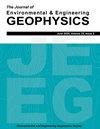Fracture Critical Length Estimative Using Percolation Theory and Well Logging Data
IF 0.7
4区 工程技术
Q4 ENGINEERING, GEOLOGICAL
引用次数: 2
Abstract
Groundwater transport in crystalline rocks follows pathways along fractured zones because of low primary porosity and permeability in such formations. Fractured systems encompass an imbricated set of joints and fractures with different lengths, apertures and orientations resulting in complex permeable systems with heterogeneous groundwater transport properties. Geophysical well logging has proved effectiveness in detecting depth levels with denser fracture distributions as well as the apparent aperture of fractures contributing to groundwater flow. In many cases, the extension spanned by a fracture network cannot be directly inferred because it may extend beyond the radius of investigation of common well logging probes, thus preventing quantitative estimation of critical length for lateral extension a connected fractured system may have. Here we apply a percolation theory model to estimate the critical length as inferred from the linear density of fracture distribution observed at the borehole wall with an optical imaging probe. Our results are analyzed with electrical well logging data (normal resistivity and single-point resistance) cross borehole slug tests using a set of three boreholes. A critical length of 3.9 m was inferred with a percolation model which revealed consistency with the cross borehole slug tests from two wells situated 10 m and 30 m in the vicinity of the monitored borehole. Our results suggest the utility of inferring critical percolation lengths from fracture parameters obtained using standard well logging imaging techniques with potential applications to evaluate groundwater resources, characterize contaminated sites and provide geotechnical information for works in fractured formations.利用渗流理论和测井资料估算裂缝临界长度
由于结晶岩的原生孔隙度和渗透率较低,地下水在结晶岩中的运移遵循裂缝带的路径。裂缝系统包括一组具有不同长度、孔径和方向的缝和裂缝,从而形成具有非均质地下水输运特性的复杂渗透系统。事实证明,地球物理测井在检测裂缝密集分布的深度水平以及有助于地下水流动的裂缝的表观孔径方面是有效的。在许多情况下,由于裂缝网络的延伸范围可能超出普通测井探头的探测半径,因此无法直接推断裂缝网络的延伸范围,从而无法定量估计连通裂缝系统可能具有的侧向延伸临界长度。本文应用渗流理论模型,根据光学成像探头在井壁观察到的裂缝分布线密度推断出临界长度。我们利用三个井眼的测井数据(正常电阻率和单点电阻率)对结果进行了分析。根据渗流模型推断出的临界长度为3.9 m,该模型与位于监测井附近10 m和30 m的两口井的井间段塞测试结果一致。我们的研究结果表明,利用标准测井成像技术获得的裂缝参数推断临界渗流长度,在评估地下水资源、表征污染场地和为裂缝地层的工程提供岩土工程信息方面具有潜在的应用价值。
本文章由计算机程序翻译,如有差异,请以英文原文为准。
求助全文
约1分钟内获得全文
求助全文
来源期刊

Journal of Environmental and Engineering Geophysics
地学-地球化学与地球物理
CiteScore
2.70
自引率
0.00%
发文量
13
审稿时长
6 months
期刊介绍:
The JEEG (ISSN 1083-1363) is the peer-reviewed journal of the Environmental and Engineering Geophysical Society (EEGS). JEEG welcomes manuscripts on new developments in near-surface geophysics applied to environmental, engineering, and mining issues, as well as novel near-surface geophysics case histories and descriptions of new hardware aimed at the near-surface geophysics community.
 求助内容:
求助内容: 应助结果提醒方式:
应助结果提醒方式:


